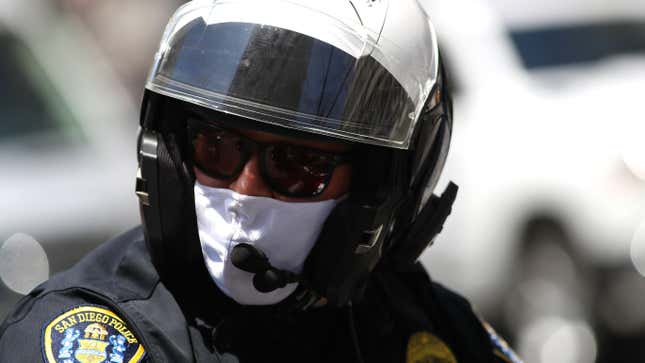
San Diego is joining a growing list of cities taking official action against the unregulated use of emergent police surveillance technologies.
Community-led efforts to address potential civil liberties violations, spurred by the deployment of more 3,000 police cameras across the city, finally paid off Friday when the San Diego City Council voted unanimously to stop police from making any future decisions about surveillance unilaterally.
Under a new ordinance, the city will assemble a privacy advisory board comprised of community leaders and technology experts over the next year. The board will review future technology proposals as well as existing products and policies to determined their impact on San Diegans’ civil liberties. Per the new measure, the city council will have final say over any technologies going forward and will re-review their use annually.
The ordinance was backed by the TRUST SD coalition, more than 30 organizations that came together to combat the secretive use of “smart streetlights” acquired by the city in 2016. San Diego had approved the lights —which incidentally came equipped with cameras and other sensors accessible by police — under an initiative established to lower the city’s energy bill.
San Diego’s then-mayor, Kevin Faulconer, ordered the cameras turned off in Sept. 2020 amid a wave of activist attention while new privacy safeguards were contemplated.
Lilly Irani, a professor at UC San Diego and member of the TRUST SD Coalition, told Gizmodo the privacy groups researched ordinances in other cities such Seattle and Oakland in an effort to devise a broader regulatory scheme that incorporated community approval.
The city council first approved the safeguards in December 2020 in two separate votes: one to establish a privacy advisory board and another to grant itself final say over the adoption of surveillance tech. Ahead of a mandatory second vote on both measures, TRUST SD spent much of the following year educating local leaders on the consequences of unfettered surveillance and data collection.
The ordinance creating the privacy board gained final approval in April. Friday’s vote solidified the council new oversight authority and handed the privacy board a key role in reviewing technologies before adoption in the future. Once the ordinance is in effect, city officials will have a year to bring surveillance systems into compliance with board-reviewed use policies.
Geneviéve Jones-Wright, another member of TRUST SD, told the local newspaper Friday that San Diego was only the second city in the U.S. to pass a surveillance ordinance incorporating a civil oversight board. Oakland formalized its privacy advisory commission in 2018, setting what digital rights group Electronic Frontier Foundation called the “golden standard” for community control.
San Diego’s ordinance is not a complete blowout for privacy advocates, Irani said. The San Diego Police Department managed to obtain two amendments in June that were rejected by community organizers. One is an exemption that will cover city employees engaged in work on behalf of federal agencies such as the FBI. Another will cap attorneys’ fees in cases brought against the city by citizens alleging violations.
Police may also cite “exigent circumstances” to deploy tech that’s yet to be approved. In policing, this typically refers to situations in which there’s reasonable belief a person is about to be harmed or killed, or that evidence of a crime is about to be destroyed. Under the ordinance, the definition is slightly broader, including “damage to property.”
Irani said a third amendment sought by police, which would have exempted any surveillance tool authorized by a warrant, appeared to be a non-starter with city leaders. TRUST SD had opposed the amendment, she said, arguing that judges are not “adequately equipped to make real-time decisions about the effect of these technologies.”
The range of consequences for data collection can be vast, she said, and tech companies often distribute and sell personal data in obscure ways.
“Oversight and transparency is a tool for communities for making sure they get to have a say,” Irani said, adding that for San Diegans, the goal isn’t merely giving subject matter experts a chance to chime in. “I see this as a tool for organizing and practicing democracy over technology, rather than just making sure experts get to advise the council.”
Irani said the support of Council President Pro Tem Monica Montgomery Steppe, the representative for district 4, was particularly crucial in the securing the coalition’s victory.
“All of this matters when the next technology comes down the pike and community members get to talk about it — or for one, even find out that it’s happening — even if some private funder or donor pays for it,” she said. “They get to actually push their electeds if they really don’t want this thing.”
The U.S. Congress is currently considering its own comprehensive privacy law, the American Data Privacy and Protection Act, which, if passed, would override numerous state and local privacy laws. The most current draft of the bill contains an exemption, however, for local ordinances aimed at regulating electronic surveillance, including facial recognition software.
Correction: A previous version of the article misstated when it said the ordinance would go into effect after a one-year delay. The ordinance would go into effect immediately with the mayor’s signature, but city officials will have up to a year to bring their technologies into compliance.